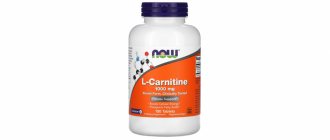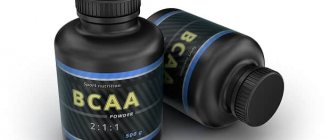© Pavel — stock.adobe.com
Share:
Of all the modern nutritional supplements for athletes, L-carnitine is the most controversial regarding its use and health benefits. Some consider it an ordinary fat burner, others are sure that it is a panacea for all diseases, while others consider its main ability to alleviate the condition during physical activity. Which of this is true and which is fiction? Is l-carnitine really so necessary for athletes and ordinary people? You will receive detailed answers to these questions in the article.
What is L-carnitine
Perhaps we should start with the name itself. It comes from the Latin word “carnes,” which translates to “meat.” Don’t be surprised, it’s meat, because the maximum content of carnitine in the body is found directly in muscle fibers.
They first learned about it back in 1905. It was discovered on the territory of what was then Tsarist Russia in Kharkov, but they were able to synthesize the drug in the laboratory only in the 60s of the last century. And only two years after this, scientists were able to understand why the body really needs it. Before this, the substance was simply considered another vitamin.
To designate it, three variants of names are used:
- L-carnitine;
- levocarnitine;
- carnitine
L-carnitine is synthesized by amino acids called methionine and lysine, but in its properties it belongs more to the B vitamins. By the way, these vitamins, along with vitamin C, folic acid, iron and other trace elements, also take part in its formation.
Artificial vitamin
Carnitine is sometimes called an artificial vitamin. Although the human body produces it in sufficient quantities for full life, it “does not know how” to create reserves for the future, as happens with other types of vitamins. Compounds that are not used by the body are simply excreted through the kidneys along with urine. The process of carnitine formation also occurs in the liver and kidneys, but the place of its greatest concentration is the muscles, heart and brain of a person.
Forms of carnitine in nature
There are two forms of existence of carnitine. This is the already mentioned l-carnitine, as well as d-carnitine. The second form is synthetic and not only does not help the body, but also interferes with the normal functioning of l-carnitine. Therefore, before purchasing, always read the ingredients and avoid products containing d-forms of carnitine. As a rule, such drugs are cheap. So don’t rush to buy a package of carnitine at an attractive price - first make sure that you won’t harm your body.
Acetyl and carnitine tartate
Acetyl carnitine appeared not so long ago and is the same l-carnitine, but in combination with acetyl molecules. Moreover, it is even patented under the Alcor brand. According to the developers, it has increased biological activity, so it can be consumed in smaller doses.
Carnitine tartate is a carnitine salt that, once in the stomach, breaks down into carnitine and tartaric acid. With this combination of microelements, carnitine absorption actually occurs faster.
Remember that any of these options are absorbed by the body and work at the same speed and productivity as plain l-carnitine. This is confirmed by research. Information about the benefits of a particular variety is just a marketing ploy. And the price of such drugs is much higher.
How does l-carnitine work?
We figured out what carnitine is. But why does the body need it and what role does it play in it? This substance takes a direct part in our lives even at the stage of fetal formation, entering the egg along with the sperm. And the further development of the embryo directly depends on it, because the main function of L-carnitine in the body is energy production.
Everyone is accustomed to thinking that we get energy from glucose, completely forgetting about fatty acids. Levocarnitine is directly responsible for their transport into cell mitochondria for further breakdown. But its beneficial properties do not end there.
Among the main properties of l-carnitine are the following:
- participation in the processes of fat breakdown;
- stimulation of metabolic mechanisms;
- anabolic effect, promoting the growth of lean muscle mass;
- lowering blood cholesterol to healthy levels;
- preventing the formation of new fat deposits, which allows the use of l-carnitine for weight loss;
- heart function support;
- saturation of body cells with oxygen;
- immunomodulatory functions;
- protection of nerve cells from toxic substances;
- improvement of muscle tissue regeneration processes;
- increasing the overall tone of the body;
- increasing the natural amount of ATP;
- participation in the process of fetal formation in humans and animals.
© Artemida-psy — stock.adobe.com
The role of carnitine in the body
All of the above properties have a significant impact on the functioning of the whole organism. Listed below are the most important life processes of the human body in which levocarnitine takes part.
Heart and circulatory system
Here, the ability of carnitine to prevent fat deposits in the area of the heart muscle comes first. According to studies, its regular use reduces cholesterol levels and prevents the formation of plaques in blood vessels, which reduces the risk of cardiovascular diseases by up to 60%.
Formation of muscle tissue
By influencing protein metabolism, carnitine exhibits a pronounced anabolic function. Moreover, the ability to saturate the blood and tissues with oxygen leads to a more complete breakdown of glucose, reducing the amount of lactic acid in the muscles. This makes it easier to endure training and get the maximum effect from them, which is especially important for athletes seeking to increase muscle volume.
Metabolic processes
As we have already found out above, levocarnitine is directly involved in the processes of energy formation. Thus, it accelerates the metabolism and breakdown of adipose tissue throughout the body, which makes it possible to use carnitine for weight loss.
In addition, it promotes detoxification and the elimination of harmful substances, such as xenobiotics, heavy metals or acetic acid. All this has a beneficial effect on the body's metabolic mechanisms. And by limiting the amount of fast carbohydrates, it helps to quickly get rid of fat reserves.
Endurance and stress resistance
This is influenced by several factors. The main ones are increasing the rate of breakdown of fats to produce energy and protecting the tissues of the nervous system from the effects of harmful substances that can enter or accumulate in the body. Equally important is the ability to increase the flow of oxygen and increase the production of endorphins. The overall effect is expressed in a decrease in anxiety and fatigue during mental and physical stress.
© nipadahong — stock.adobe.com
Indications for use
The reasons for taking l-carnitine can be very different: from medical purposes to the most banal - for weight loss. Let's take a closer look at all the cases in which it would be advisable to use this drug.
When there is a deficiency of a substance in the body
Knowing that carnitine is produced by the body and can be obtained from food, many firmly believe that a deficiency of the substance in the body is simply impossible. But this is far from true. It’s worth starting with the fact that the body synthesizes only 10-25% of the daily dose. And we prefer thermally processed food, that is, with destroyed l-carnitine.
So a lot of people actually need it. How to determine this? If you have the following symptoms, this is a signal of insufficient intake of the substance:
- You quickly get tired at the slightest physical exertion - be it brisk walking or climbing stairs.
- Unpleasant pain, even cramps, after sports or other physical activity.
- Tremor of the arms and legs, constant muscle tension.
- If your workouts do not bring any results.
- Shortness of breath, dizziness, weakness and irregular heartbeat during exercise.
To replenish energy reserves
Regular exercise requires a lot of energy. And some prefer to get it from energy drinks, of which there are dozens of varieties. The side effects of such drinks are serious - the impact on the cardiovascular, autonomic and digestive systems, not to mention the general harm to the kidneys and liver. And such energy is spent as quickly as possible.
The most reasonable, and most importantly, harmless way to increase endurance and replenish energy reserves for athletes is carnitine. Its use both before training and during the day significantly reduces fatigue. And the removal of residual lactic acid in the muscles makes training more intense, minimizing the unpleasant consequences in the form of soreness.
When drying
It is a common belief that those very desired muscle definitions can be achieved through training alone. No one, of course, argues with this - it all depends on their number and intensity. However, the correct approach to creating relief also includes special nutrition aimed at reducing the layer of subcutaneous fat. In other words, this process is called “drying the body.”
This is a rather lengthy process associated with certain difficulties, which can be facilitated by using carnitine. The accelerated process of transporting fats into the mitochondria for energy will reduce the likelihood of muscle tissue breakdown during training during this period.
Prevention of fat deposits
Often, bodybuilders face the problem of gaining weight after competitions, caused by returning to their previous diet and training regimen. And this is where l-carnitine’s ability to prevent the formation of fat deposits comes to the rescue. The second advantage for this category of athletes is the anabolic properties of the drug, which stimulate the growth of exclusively lean muscle mass.
© Eugeniusz Dudziński — stock.adobe.com
For weight loss
Recent studies have shown that a common cause of excess deposits is a deficiency of levocarnitine in the human body. A lack of the substance makes it difficult to break down fats during exercise, forcing the body to “eat” muscle fibers in an attempt to replenish energy reserves. Along the way, all metabolic functions slow down and a feeling of chronic fatigue develops, which also does not contribute to physical activity and weight loss.
In such cases, taking carnitine can radically change the existing state of affairs. The body will begin to use fat deposits directly, not only subcutaneous, but also fatty plaques in blood vessels, which helps accelerate blood flow and saturate cells and tissues with oxygen. Which again speeds up the process of fat breakdown. Moreover, consuming l-carnitine before training will almost double the number of calories burned.
With high mental activity
The feeling of fatigue is not only physical. People whose work involves intense mental activity burn no less calories than athletes. And they are familiar with the concept of fatigue and apathy firsthand. The property of L-carnitine to increase the amount of energy released plays a decisive role here. Although we should not forget about the general increase in body tone and increased production of endorphins, which simply lifts the mood and eliminates the feeling of depression or headaches from fatigue.
To speed up regeneration in old age
The ability of carnitine to accelerate regeneration processes prompted Italian scientists to undertake an unusual experiment. It involved people over 100 years of age, whose main symptoms were chronic fatigue, fatigue and low activity. The use of just 2 g of levocarnitine for six months led to stunning results. Among them, one can highlight an increase in muscle mass of up to 4 kg on average for each test subject, a decrease in fat fiber from 1.5 to 2 kg and noticeable improvements in the functioning of the brain and cardiovascular system. Naturally, the rates of fatigue and weakness also decreased significantly.
© virtuoz9891 — stock.adobe.com
What results should I expect?
L-carnitine itself is not capable of burning fat; it is a transporter of fatty acids to produce energy, which is necessary for productive training aimed at burning fat.
The benefit of the substance is that it accelerates energy production by 50%, the body immediately “takes” fats, instead of consuming glycogen. During the first 20 minutes from the start of training, muscles burn glycogen (carbohydrate), only then they begin to burn fats as fuel. With L-carnitine taken before training (from the moment the substance begins to act), the process of using fat begins immediately. This means that the supplement accelerates the fat burning process twice as fast.
L-carnitine works much more effectively with fat burners and a high-protein diet. An integrated approach - supplements, nutrition and training - can lead to a loss of 3-5 kg per month.
Features of use as a means for weight loss
If you analyze the composition of most dietary supplements used for weight loss, it will be easy to notice that each of them contains levocarnitine. Its presence in the formula of weight loss drugs is a necessary condition for starting the breakdown of fat cells. Often the body simply does not use accumulated fat deposits for energy, limiting itself exclusively to glycogen reserves. The reason is the increased content of fast carbohydrates in the diet against the background of a lack of physical activity.
And if an athlete’s body can easily use up a large amount of fast carbohydrates, then for an office worker these are simply critical indicators. As a result, even after starting to exercise, an overweight person notices that the fat layer does not decrease as much as they would like. And even cardio and aerobic exercises do not bring any visible results. In such cases, adding levocarnitine to the diet is the most successful solution.
But there are some nuances here too. For the substance to work properly, it is necessary to combine it with a decrease in the consumption of foods rich in carbohydrates. Ideally, you should keep carbohydrate intake to a minimum before training.
During aerobic exercise, it is recommended to consume about 2 g of carnitine half an hour before training. Use during or after training will not give the desired effect.
Rules of use and dosage
To achieve the maximum effect from taking l-carnitine, the diet must contain proteins in the required amount and vitamins B and C. Let's consider how to take carnitine depending on the purpose of use.
For athletes
In people who subject themselves to regular and intense exercise, there is a need to increase the daily norm of carnitine. So, for the average person this norm is from 200 to 500 mg per day. While an athlete spends up to 3000 mg per day.
There is no point in consuming more of the drug, since the body simply will not be able to absorb it and will simply eliminate it with other waste products. A dose below 500 mg will not bring any effect at all.
The reception is divided into two times:
- The first is immediately after waking up before eating. At this time, levocarnitine will have the most beneficial effect on the body.
- The second is 20 or 30 minutes before training. During this time, it will have time to assimilate and will be able to speed up energy exchange processes as much as possible.
On non-training days, divide the dose into three to four 500 mg doses before meals.
As a means for weight loss
If you decide to take L-carnitine for the purpose of losing weight, then remember that a one-time use of 1000 mg before training will not have the desired effect. Please also take into account the following tips:
- A single dose of the drug for weight loss should be at least 1500 – 2000 mg.
- Please note that for it to work effectively, carnitine must have time to be absorbed, so it should be taken before training, and not after it or during training. If you forget to take the supplement on time, there is no point in taking it later.
- In parallel with taking carnitine, be sure to follow a low-carbohydrate diet. At least two meals before training should be predominantly protein. Remember to eat at least 1g of protein per kilogram of your weight. Limit your fat intake to 60 g per day.
- L-carnitine may cause an increase in appetite, but don't fall for it. Break your meals into 5-6 times. Otherwise, you risk not achieving the desired result.
- Remember to take at least 2000 mg of carnitine every day, even when not training, divided into 4-5 servings before meals.
Combination with other drugs
L-carnitine combines well with other dietary supplements and vitamins D and B, ascorbic acid, various micro- and macroelements for daily intake (magnesium, zinc, calcium, etc.).
However, the dosage of L-carnitine must be reduced when used together with glucocorticoids - steroid hormones.
L-carnitine is not recommended to be taken in conjunction with drug treatment. Dietary supplements can enhance or weaken the effect of drugs. As already mentioned, the main thing is to consult with a specialist.
Natural Sources of Carnitine
As we have already found out above, carnitine is concentrated mainly in muscle tissue and is synthesized in the liver and kidneys. From this it is clear that products of animal origin contain the maximum amount of this substance. To put it simply, the “redder” the meat, the more saturated it is with carnitine.
Among dairy products, the compound is present in whole milk, cottage cheese and cheeses. The content in nuts, cereals and fruits is negligible. The only exception is avocados. Therefore, it is difficult for vegetarians, especially vegans, to get additional milligrams of the substance from food.
You can see the l-carnitine content in some of the most popular foods in the table below.
| № | The product's name | Content per 100 g |
| 1. | beef | 85 – 93 mg |
| 2. | pork | 25 – 30 mg |
| 3. | liver | 100 mg |
| 4. | white meat | 4 – 5 mg |
| 5. | chicken eggs | 0.01 mg |
| 6. | whole milk | 3.3 mg |
| 7. | peanut oil | 0.1 mg |
| 8. | cereals | 0.03 – 0.01 mg |
| 9. | avocado | 1 – 2 mg |
Taking into account the data given in the table, you can adjust your diet, taking into account the daily intake of a particular product. However, in conditions of increased physical or mental activity, when there is a need to increase the dose of the substance, it would be advisable to use carnitine-containing supplements. This will reduce the load on the digestive tract and eliminate allergic reactions.
© Yakov — stock.adobe.com
Release form
L-carnitine is a powdery substance consisting of small white crystals that resemble sugar in appearance. It dissolves easily in water. Since the drug is used both for the needs of athletes and in the treatment of various diseases, the dosage and accompanying components contained in the capsule or bar may vary significantly. Below we will talk about the advantages and disadvantages of each of the available forms of carnitine.
- Drinking . The most popular form of release, the optimal combination of price/speed of absorption. Often contains vitamin C, trace elements and free calcium ions. The product may contain sweeteners and flavoring agents, so please read the ingredients carefully before use to avoid consuming any undesirable substances. Among the disadvantages is the limited shelf life after opening the lid.
- Encapsulated . It is convenient because it contains coarse fibers that prevent the feeling of hunger after taking the drug. The composition contains added caffeine, vitamins and various microelements. The most economical option. Among the disadvantages, one can highlight only the duration of absorption - you need to take it an hour and a half before training.
- Ampoules . Contains a single dose of pure carnitine. Absorbed almost instantly. The downside is the high price.
- Bars . Contains a limited amount of l-carnitine. They are convenient because they can be used as a meal replacement.
- In powder form . The most rare form of release, inconvenient to apply and use. It is used no more than 1 g per day.
- As part of medications . L-carnitine is included in many medications. But the dosage in this case depends on the general direction of the drug, so it is unacceptable to use it without a doctor’s prescription.
© pictoores — stock.adobe.com
Daily dose of product
The daily dose depends on several parameters:
- height and weight of a person;
- training intensity;
- number of classes weekly;
- presence of concomitant diseases and contraindications.
Typically, l-carnitine is used as follows:
- High concentration liquid drink - 30-50 ml daily.
- Low concentration liquid drink - 300-500 ml before training.
- Pure carnitine tablets - from 2 to 5 pieces daily.
- Capsules - 1-3 daily.
- Powder - 1-5 grams, diluted with water, before training.
Only a specialist can determine the exact dosage and dosage regimen.
Taking carnitine: all the pros and cons
L-carnitine, like most drugs used by athletes, causes a lot of misunderstandings and controversial opinions. Considering all of the above, we can judge with sufficient grounds its advantages and disadvantages.
Advantages of the drug
- Reduced mental and physical fatigue.
- Stimulates fat burning processes.
- Does not cause side effects.
- Has a general strengthening and immunostimulating effect.
- Promotes the growth of lean muscle mass.
- Protects the heart and blood vessels from the effects of cholesterol.
- Reduces muscle pain after sports.
- Makes cardio and strength training easier.
- Slows down the aging process.
- In parallel with it, you can use any other additives.
Cons and contraindications
There are practically no downsides as such - this is a natural compound that is synthesized by the human body. The only problem may be failure to take breaks between courses of taking levocarnitine, as this can lead to the body simply stopping creating it itself.
Please note that in a healthy person, if the dosage is observed and the instructions are strictly followed, no side effects can occur.
But there are a number of diseases for which taking carnitine is possible only with the permission of a doctor and strictly according to his recommendation.
Such diseases include:
- disorders of the thyroid gland;
- diabetes;
- epilepsy;
- kidney diseases.
Although during pregnancy and lactation the need for levocarnitine increases significantly, it can only be used after consultation with a supervising doctor. Since today there are no reliable studies on this topic, appointments are prescribed based on individual physical indicators.
© pictoores — stock.adobe.com
Recommendations for losing weight
Balance your diet
The diet should contain a minimum of fats (10-20%), proteins (50-60%), carbohydrates (30-40%). The balance of nutrients will eliminate the possibility of gaining excess fat, reducing carbohydrates (excluding simple sugars) will provide an energy deficit, and this will speed up the process of using fats for the body’s energy needs. You should not take L-carnitine with fatty foods, including animal fats; consume only unsaturated fatty acids (Omega-3, 6, 9).
Increase your cardio
Aerobic exercise will allow you to use fats faster with the intake of L-carnitine for fuel. In addition to strength training, add 3-4 cardio sessions per week. You can also combine cardio and strength training on the same day. In this case, take one serving of L-carnitine (1 g) before cardio 30-40 minutes, the second before strength training. The average duration of cardio training should be 40-45 minutes of intense exercise.
Another effective way to burn fat with L-carnitine is to perform two cardio workouts a day for 30-40 minutes. Before your first morning workout, take 1 g of L-carnitine 40 minutes before doing cardio on an empty stomach, this will speed up and increase the amount of fat burning. The second workout is performed before bed, in the evening. Take 1 g of the substance 40 minutes before the second cardio, do not eat after exercise. It is allowed to take a serving of BCAAs to prevent muscle burning. Drink plenty of water throughout the day.
3. Do circuit and interval training
When training for endurance, you can burn fat faster, because when training with a high number of repetitions without rest, much more energy is needed, which will be used from fat depots. You need to consume L-carnitine according to the usual regimen - 2 g of the substance 40 minutes before training.
Popular questions about carnitine
People who have taken carnitine for a variety of purposes note that they have improved overall health, increased performance and brain activity. There are many positive reviews from athletes who emphasize increased endurance during training and assistance in drawing relief during the drying period.
There are no less positive reviews from girls trying to lose excess weight. As an analysis of publicly available information shows, the only negative reviews about carnitine come from people who did not engage in training while taking the supplement, hoping only for its miraculous power. Their expectations were not met, which is quite natural.
We have selected the most frequently asked questions and prepared short answers to them so that you can form the most complete opinion about this drug and its action.
| Questions | Answers |
| Is carnitine an amino acid? | No, but it arises by synthesis from two amino acids: methionine and lysine. |
| Does it affect the intrauterine development of the child? | Yes, since the embryo will receive the energy necessary for development exclusively from fatty acids. And their breakdown is impossible without the participation of l-carnitine. |
| Is it possible to get the required amount of l carnitine from prepared foods? | No, because it dies during heat treatment and is found in small quantities in products. |
| Why is L carnitine called a fake vitamin? | Because the body can synthesize it in small quantities on its own. |
| Is it possible to overdose when using carnitine? | This is only possible with regular and significant excesses of the daily dose, since unused residues are simply excreted from the body in the urine. |
| Is it possible to significantly lose weight with levocarnitine without training? | No, because its maximum concentration is in the muscles, and double fat burning occurs directly during physical activity. |
| Does it really increase the body's resistance to stress? | Yes, since carnitine is involved in the processes of protecting nerve tissue from harmful substances. |
| Is it possible to increase endurance during training if you take carnitine before it? | Yes, because due to its properties it increases the overall tone of the body. |
| How long can you take the drug without harming your health? | It is advisable to alternate courses every 2 months so that the body does not stop producing carnitine itself. |
| Is L-carnitine considered a medical drug? | It is included in many medications of various types, ranging from those that improve digestion to drugs for the treatment of male infertility. This is due to the critical need for this substance for the healthy functioning of the body. |
| Is it really prescribed for anorexics? | Yes, because it normalizes metabolic processes, stimulates appetite and promotes the growth of lean muscle mass. |
| Does levocarnitine cause side effects when used? | No, it is harmless to the body. Side effects can be caused by additional substances that the manufacturer includes in the drug. Read the ingredients carefully before use. |
Consumer Reviews
Consumers who regularly use L-carnitine before training note that exercise has become much easier to tolerate. There is a surge of strength and energy, and increased endurance.
The following brands are recommended for regular use:
- UNS L-Carnitine 1000;
- Biotech L-Carnitine 100000;
- Liquid;
- ExtrifitCarni;
- PowerProCarnitine 5000;
- Carnitine 5000.
The cost of supplements varies. One ready-made drink can cost about 30-50 rubles, and a course of capsules or powder can cost from 900 to 2500 thousand rubles.
According to reviews, carnitine can be a good aid in losing weight, especially during training and classes with a trainer. The main thing is to find your release form, select the required dosage, and take it strictly according to the instructions.










